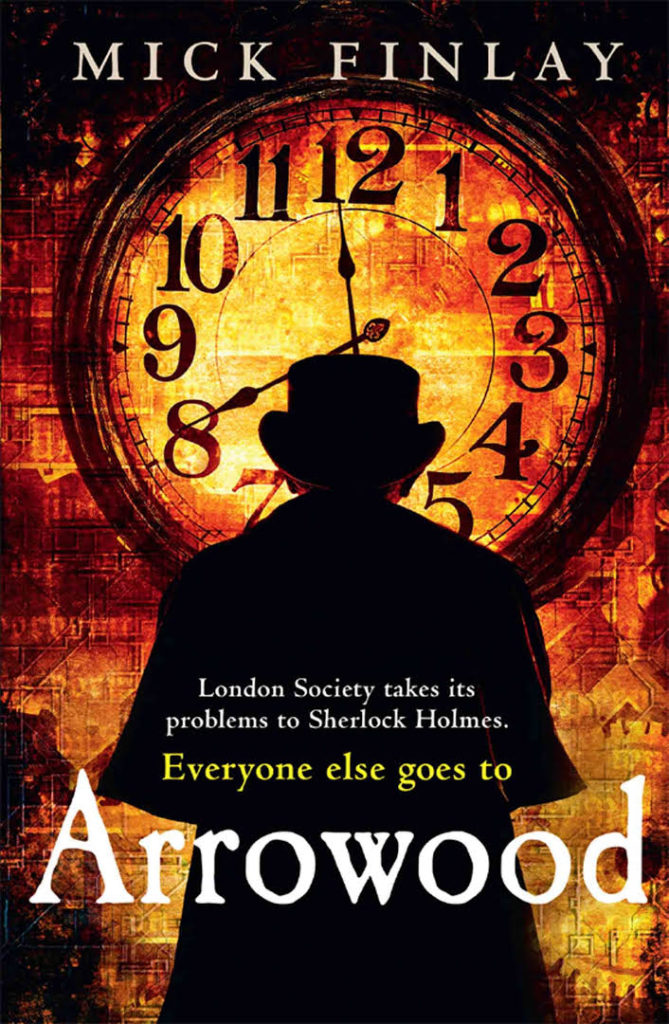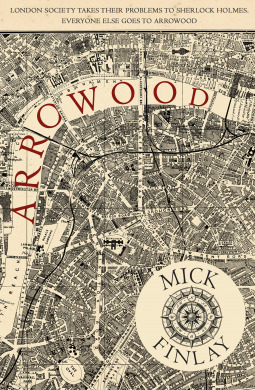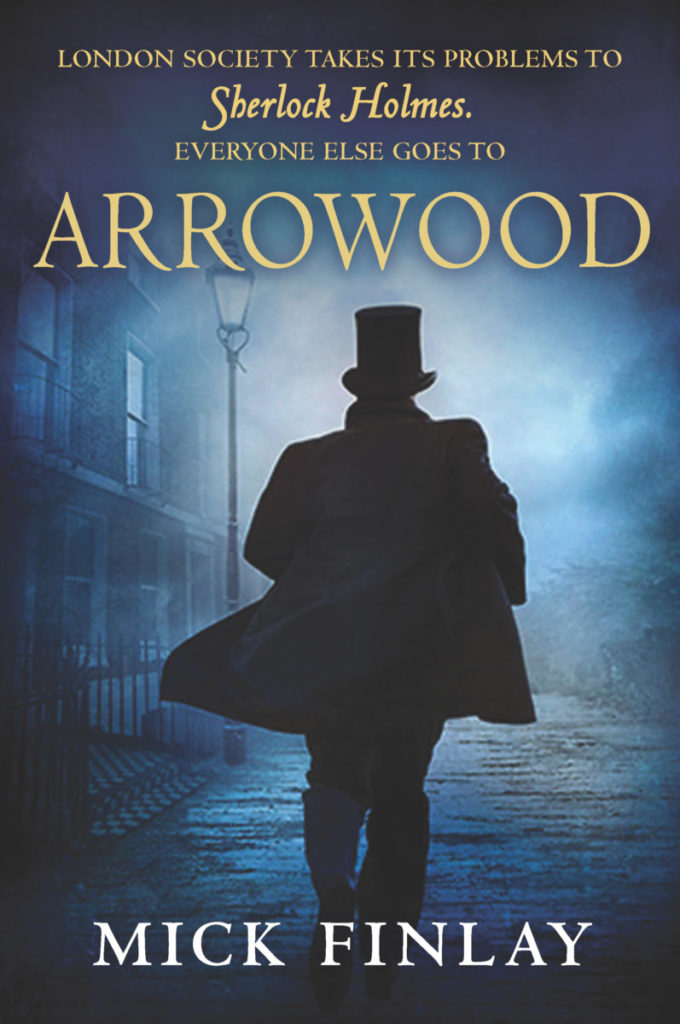Book Review: Mick Finlay: Arrowood

When I first read about Arrowood as an anti-Holmes, I was intrigued. Of course Sherlock Holmes himself constantly criticizes fictional detectives, and Mick Finlay set out to create a character who has his own methods of solving cases, and who happens to severely dislike Sherlock Holmes.
It is the year 1895 – THE year, for Sherlock Holmes and John Watson. But we are not in Baker Street in front of a fire. We are in a small rented flat in South London. Former journalist William Arrowood, a man who is so vividly described in all his unappealing attributes that even when he shines, there is always a sense of discomfort and disgust overshadowing the action, and his sidekick Norman Barnett, a man who suffers from poverty, heartbreak and disillusionment, set out to solve cases Sherlock Holmes wouldn’t touch with his brother’s brolly’s pointy end. And their adversaries are not to be underestimated, as their current unhappy disposition is largely due to the criminal interference of Stanley Cream, king of crime in South London, who promised them both a gruesome end if they ever interfered with his work again.
Trying to recover from the loss of work and dignity, Arrowood offers his services to those who cannot afford or do not wish to consult Sherlock Holmes. When a young, French lady, who introduces herself as Caroline Cousture, appears in Arrowood’s premises, begging him to find her brother Thierry, the private detective believes he has found a case which might redeem him a little. But what starts off as a fairly straightforward case soon leads to murders, blackmail, an involvement with the Fenians, and physical harm to all involved. Unsurprisingly, all of these problems somehow lead back to Cream.
It is difficult to offer more plot descriptions without going into too much detail or without spoiling the end, so let me write a little more about the style of the book. As with the Sherlock Holmes stories, this mystery is told from the perspective of the sidekick, who, in comparison to Watson, is much more honest and critical of himself and his employer. The lower social class of the narrator becomes apparent not only in the accent he uses in his narrative, but also through his behavior. He does not shy away from physical violence and, as part of his strategy to get people talking, frequently drinks his way through the pubs of South London – as does Arrowood, despite their respective difficult financial situations.
The book starts with a very unfavourable description of Arrowood, which came as a surprise to me, but which also clarified that there would be no adulation and sugar coating in this novel. This  honest narrative style drew me in immediately as it offers an authentic feel of the situation and especially the social circles in which the protagonists move.
honest narrative style drew me in immediately as it offers an authentic feel of the situation and especially the social circles in which the protagonists move.
The mystery itself is quite complex, much to the dismay of the detective and Barnett, and to the benefit of the reader, and there are no loose ends left in this book, which is something I appreciated very much.
We also meet a couple of truly wonderful female characters in this story, and it doesn’t hurt that Barnett is quite the feminist, too.
After two chapters, I was wholly immersed in the story and remained so until the end. Due to work and other commitments, I could not read this book in one go, and it has been quite some time (since Lyndsay Faye’s Gotham Trilogy or The Watchmaker of Filigree Street by Natasha Pulley) since I spent the hours and days between reading new chapters thinking and worrying about the characters and what might happen to them. The characters are all flawed, and beautifully so. They are complex and sometimes unjustifiably ignorant or stubborn and once I had finished the novel, I took a deep breath, knowing that for just a few hours, everyone was stationary and at least partly alright, before new adventures and very likely quite a few stupid decisions would await them.
I also truly enjoyed the jabs at Sherlock Holmes. Quite obviously born out of jealousy and prejudice, but also secret admiration, Arrowood occasionally gives us a piece of his mind of what he thinks of the great detective. At one point, the story even hints at Dr. Watson’s presence during one of Arrowood’s escapades when he explains to a lady on a train that Holmes’s solution cannot possibly have been the right one. We don’t get the satisfaction of knowing what Watson might have told Sherlock that night in front of the fireplace with a tumbler of brandy in his hand, but I guess that’s what fanfiction is for.
In any case, I found Arrowood truly enjoyable and I dearly hope that Mick Finlay will continue to write about the flawed duo and their adventures.
You can get the book on amazon.co.uk, amazon.com (the Paperback comes out on July 19), amazon.de, book depository or directly from HarperCollins.
(HarperCollins kindly sent us a review copy)


Maria teaches English Literature at Leipzig University, Germany, published a German introduction to Sherlock Holmes and is a fan of all things Holmes – but especially of the Canon stories and Sherlock BBC. Contact her at @stuffasdreams & maria@bakerstreetbabes.com
Thanks, I have recently been hunting for info about this subject matter for ages and yours is the best I have discovered so far.